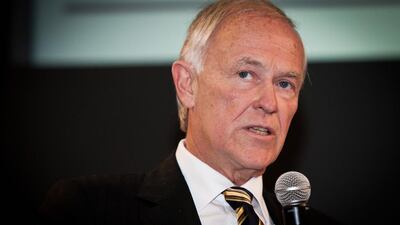The UAE is a country of air travellers, and this Eid is expected to be the busiest-ever period at its airports. Dubai International, which already handles 180,000 passengers on an average day, has hired extra staff to cope with increased demand. Given that there have been three major airline crashes in the past two weeks, the safety of the flights they are taking will be foremost in the minds of many of those passengers.
While commercial aviation remains by far the safest form of transport, the shooting-down of Malaysia Airlines flight MH17 over Ukraine, at the cost of 298 lives, has focused attention on the risks posed to passenger jets flying through conflict zones. Sadly, there is no shortage of conflict in this region – and that’s an issue that has occupied the attention of Emirates Airline president Tim Clark in recent days.
Last week, Mr Clark called for an airline summit to draw up rules to address the issue. This week, in an interview with The Times of London, he said that Emirates would no longer fly to or over Iraq due to concerns that the Islamic State group, which controls large parts of Iraq including the city of Mosul, possesses surface-to-air missiles. Currently, hundreds of planes fly over Iraq each day.
The decision could not have come easily to Emirates, given that it may hurt the business’s bottom line. In a very competitive industry, airlines naturally choose to fly the most direct route to save on fuel and maintenance costs, and to run the most efficient schedules. Already facing steep insurance bills, carriers that avoid trouble spots will now face higher fuel bills as their distances travelled and flying speeds increase.
Mr Clark has, rightly, called on intelligence agencies to advise commercial carriers about the risks in certain air corridors, and indicated that the airlines will have an information-sharing network of their own by the end of the year. This should serve as some comfort to passengers.
In taking action, Mr Clark is far ahead of the politicians – especially those in Ukraine and Russia – who are still pointing fingers at each other in the wake of the MH17 tragedy. But should Emirates and other airlines – and, indirectly, their passengers – have to bear all the costs of action that is taken for the sake of safety? Given that the lives of their citizens are at stake, shouldn’t governments do their bit by reducing the taxes and fees they impose on carriers forced to avoid unsafe airspace?

